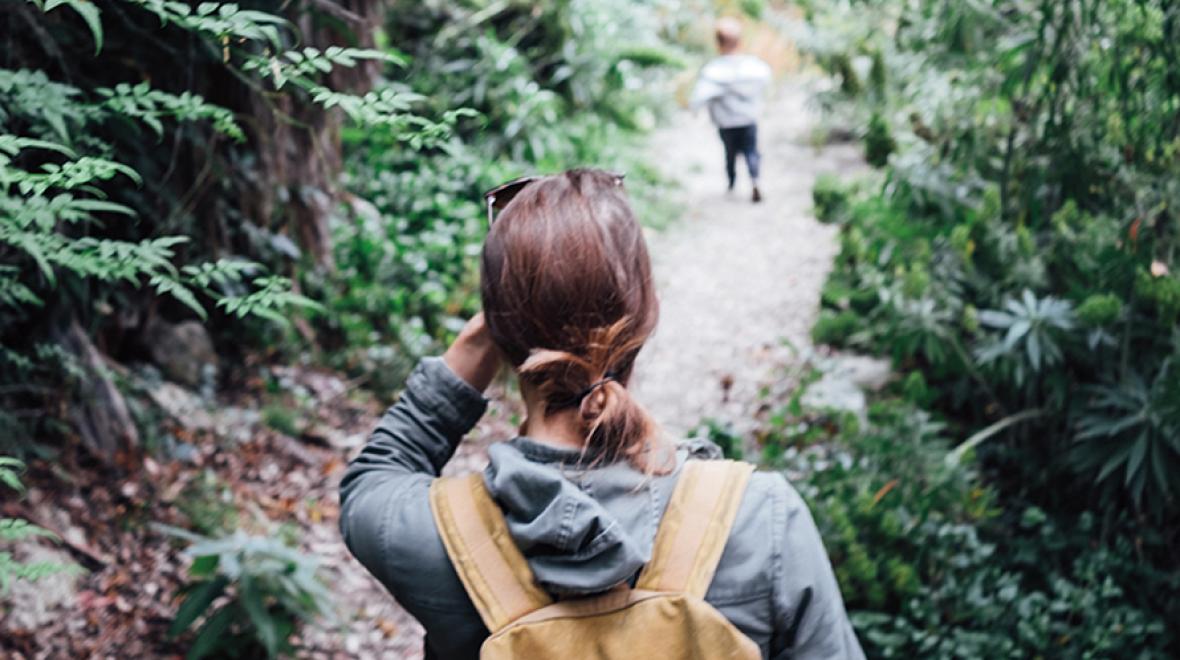
Photo:
Credit: Paul Hanaoka, Unsplash
If you’re out of touch with your inner zen and looking for a simple way to de-stress, it’s time to get down to earth. Soaking in Mother Nature’s glory is extremely therapeutic, and it doesn’t cost a dime! Numerous studies credit spending time in nature with a wide range of measurable physiological and psychological benefits: It reduces stress and anxiety, lowers blood pressure and heart rate, boosts immunity, improves focus and attention, enhances emotional well-being, speeds healing and may even decrease mortality rates.
Harnessing nature’s full healing potential isn’t complicated, but it does require mindfulness and intent. Read on for practical ways to take advantage of nature’s soothing, restorative health effects as a family.
Nature Rx: Shinrin-yoku — immerse yourself in the forest
Originating in Japan, shinrin-yoku, or forest bathing, is the practice of absorbing nature with deliberate intent and focus, using your full sensory capacity. “Shinrin-yoku is not hiking or walking fast through a forest. It’s really about taking your time and immersing yourself slowly into the forest, being mindful of the five senses,” says Margaret M. Hansen, Ed.D., MSN, R.N., the co-author of a scoping review detailing the benefits of shinrin-yoku.
The first step to practicing shinrin-yoku is to be in nature without a destination in mind, says Seattle-based forest therapy guide Michael Stein-Ross. “We’re experiencing nature through our senses, and children seem to be in that mode already, so just let them lead and play with them. As you play, model tenderness and curiosity and slowness. So, if my kid is playing swords with a stick and beating down bushes, we’ll just slow down a little bit and maybe think about tenderness,” says Stein-Ross.
To strengthen our children’s respect and appreciation of nature, it’s important for us to teach reciprocity. “[Shinrin-yoku] is not an extractive process. … Relationships are built on experiences over time with a give and take. Help your child become aware of all they received from the forest, and practice finding ways to give back. Some things I do with my kids are talking and singing to the trees out in the woods and giving offerings, whether with stones or leaves or building a fairy house — whatever it might be,” says Stein-Ross. “When they’re older and those playful things are losing some of the magic, I take my kids to join restoration projects and tree plantings, where giving back feels more concrete.”
Nature Rx: Grounding to receive Earth’s healing energy
Grounding, or earthing, entails placing your bare feet upon natural ground, connecting to Earth’s healing energy field. Regularly practicing grounding improves sleep, decreases stress, elevates mood and increases immunity. One study correlated grounding with sustained health benefits, including reduced inflammation, increased healing and enhanced well-being.
To maximize benefits, parents should institute a practice of actively grounding with their children for 20–30 minutes each day, or as often as possible, says holistic health practitioner and naturologist Julia Scalise, D.N., Ph.D. “Planning at least a weekly activity that allows everyone to be in direct contact with the earth needs to be scheduled and adhered to, even if only done seasonally, and even if only as a local day trip. When it is a fun family activity, participation is easier and there will be less resistance,” advises Scalise.
Just sitting in the yard with our feet in direct contact with the ground is sufficient, but Scalise recommends incorporating grounding in other shoe-free activities, such as open-air board games, an alfresco family movie night, or simply eating a meal outdoors in nature, in order to counteract our kids’ excessive exposure to screens. “Children today spend so much time on electronic devices, especially now since the change in schooling to mostly online, that they hardly ever get a break from electromagnetic field radiation. Making time to reconnect to the Earth’s healing magnetic frequencies will benefit them greatly,” says Scalise.
Nature Rx: Variety is the spice of a life full of wonder and awe
There are countless ways to spend time outdoors. To connect with nature as a family, Scalise recommends exploring local arboretums, zoos, gardens, farms, wildlife rescues or preserves, nurseries and hiking trails.
Gardening is a fun and accessible way for kids to interact with nature. As a bonus, it helps nudge them to eat healthier while allowing them to experience the satisfaction and responsibility of caring for living things.
Birding is another great means of connecting mindfully with nature. Bryony Angell, a wild-bird enthusiast and mom of two who lives in the Skagit Valley, prefers birding solo. “Birding gets me outside and on a walk. It gets me out of my own head. … The ability to hear birdsong through other environmental noise is a nice thing; I am grateful to be able to winnow out other noise and hear the song of nature. Casual birding is relaxing, but serious species-counting birding is thrilling! I get a total high when I see something amazing, like a species new to me,” says Angell.
Birding requires attention to detail. “Good hearing is going to get you further in birding than good eyesight. We have visual enhancers like binoculars and spotting scopes, but most of the time you will hear birds long before you see them, so paying attention to birdsong and sound is the starting point for [noticing] birds. It does not matter if you can identify the birdsong — just listen for it and then try to narrow down where the sound comes from,” says Angell.
Nature Rx: Playing in dirt boosts immunity (yes, really!)
Being in nature, particularly in a wooded area, increases our level of a white blood cell type called natural killer cells, which are one of our immune system’s first lines of defense, says Bellingham-based naturopathic physician Jenna Jorgensen, N.D. “Just being outside around nature is a huge natural boost to your immune system,” says Jorgensen.
The next time your kids go outside to play, fight those germophobic instincts and allow them to use their hands to feel the natural textures of the earth. “The microbial diversity kids are exposed to when they’re playing in the dirt, touching plants and trees and bugs and all of those things, helps with balancing our own ecosystem within our gut. Sixty percent of our immune system lives in our gut, so if there’s an imbalance in that microbiome, it can really negatively impact our immune system. Exposure to soil microbes actually helps balance the microbiome, and the microbiome has a huge connection to your mental health and your brain health. It has a huge impact on your general sense of well-being,” says Jorgensen.
Exercise outdoors is becoming increasingly vital to counteract the inordinate role electronics play in our children’s lives. “Nature calms the nervous system down and really helps to offset that sedentary screen time. I would argue it’s essential to try and offset that with nature, because if we don’t, there’s a huge lack of movement and engagement of all the different aspects of the body, which in kids is just so darn important for neurological development,” notes Jorgensen.
Nature Rx: Nature solutions for urban dwellers
Pockets of greenspace, such as community patches of land, parks, gardens and urban farms, are necessary when it comes to promoting the health of city dwellers and increasing their quality of life. “Sadly, so many children are enveloped in concrete jungles. Children and the family should be encouraged to visit parks and playgrounds, if safe or available, and sit with [their] shoes off. Any place that has grass or sand works. Starting a grassroots organization to rehab a local abandoned lot ... may work for some, with fundraising or local community, business and/or government support,” says Scalise.
Checking out books from the library, watching nature documentaries or listening to soundtracks of birds singing at home are other ways to access nature within an urban setting, says Stein-Ross. “Instead of rushing through your house in five minutes and watering all the plants, take 20. Nature is everywhere. Just take the principles of tenderness and openness and slowness, and you can find it.”
No matter where we live, it’s possible to access nature. “Even in urban areas, if you grow parsley in a pot in your kitchen, you can smell it. You can taste it. You can love it, observe it, watch it grow and take in gratitude for it. Gratitude has a direct effect on stress levels. Appreciation of nature will allow you to achieve joy, happiness and self-actualization,” says Hansen.
Reaping the incredible benefits of nature’s bounty is simple and costs nothing. If we collectively embrace its healing power and therapeutic properties, we’ll all live on a kinder, calmer and happier Earth.











